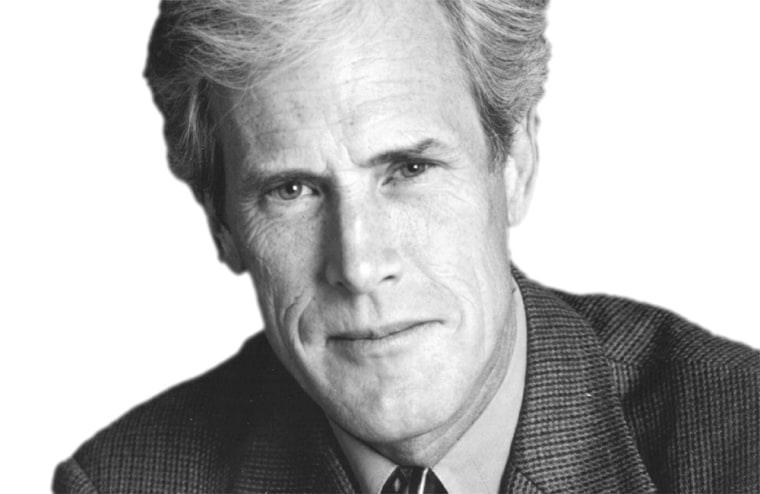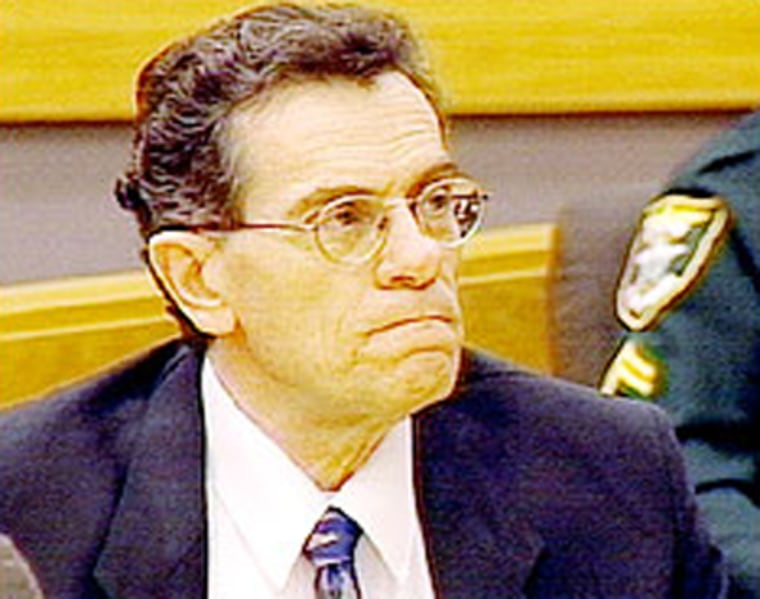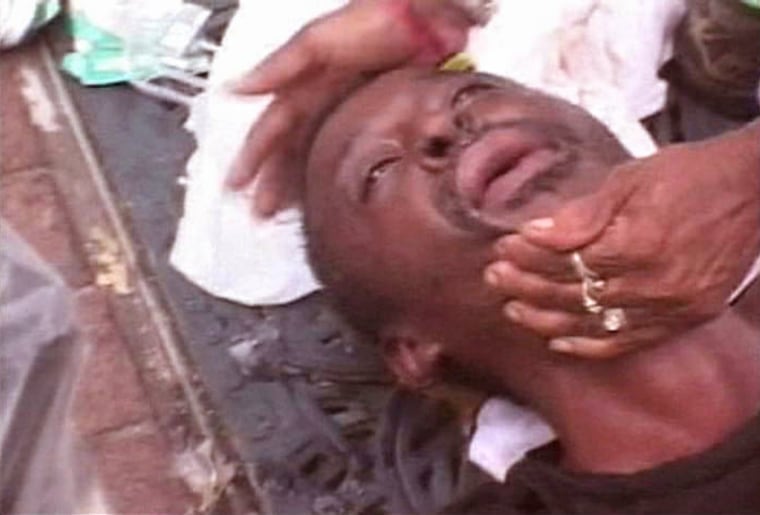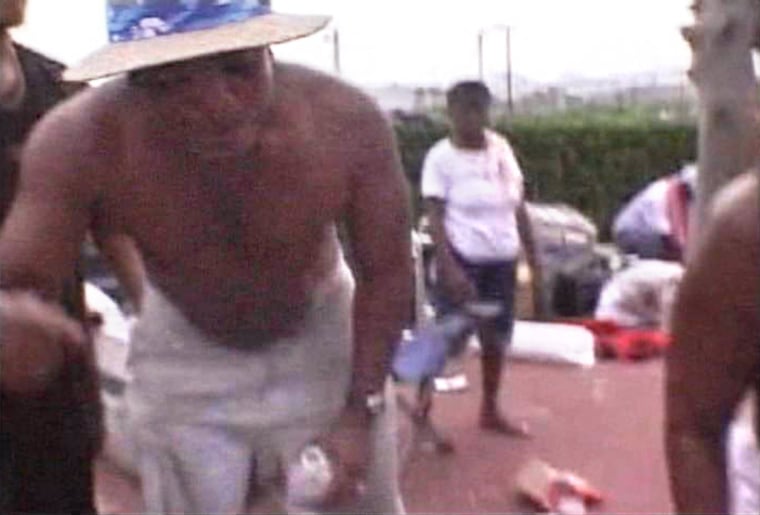• August 10, 2006 |
Hell, you say? (Keith Morrison, Dateline correspondent)

I suspect there are no more central questions for every single one of us than the questions about belief. Is there a God? Is there life after death, is there a heaven, or hell?
Americans, as we all know by now, are far more likely than, say, Europeans, to answer that whole basket of questions in the affirmative. A Harris poll of our attitudes conducted a few years ago found that 94 percent of American adults believe in God, 89 percent in heaven and 73 percent in hell. For professing Christians, those numbers are even higher.
But its hell we're interested in here, and it turns out that Americans have a wide spectrum of expectations about what might happen there, from truly awful torments of the fire and brimstone type, to eternal separation from God, to some unkown bad outcome after death. And here's a truly fascinating twist in our hellish expectations: hell is for other people! Fully three-quarters of survey participants felt pretty sure they will be going to heaven when they die, while just 2 percent expected they would wind up in hell. Wishful thinking?
Which brings us to the three characters I'd like you to meet, here and in our broadcast story.
It's Carlton Pearson's story, of course, the tale of a Pentecostal bishop who wrestled with the question of hell and its place in Christian dogma, and paid a terrible price when he announced his change of heart. But Carlton's struggle is also a real issue for millions of other sincere Christians (and non-Christians, remember, everyone now alive is or will be confronted with the question). And Carlton turned out to be a wonderful communicator for the journey.
In the end, he proposed some possible answers to our shared dilemma. Do they make any sense? Are they dangerously misguided? I don't know, but I certainly enjoyed talking to this charismatic and intelligent man.
Now, it happens that one of Carlton Pearson's school mates at Oral Roberts University has since become one of the most influential Christian spokesmen in America.
His name is Ted Haggard, pastor of New Life Church in Colorado Springs. Pastor Ted invited me to sit in the front row of his crowded, football field sized church one Sunday morning, then sat down in front of our camera to talk about hell. Haggard is down-to-earth, funny, and extremely bright. He also believes wholeheartedly in what he says is a strictly Biblical definition of hell: a real place, with real and eternal torments for the unsaved. You can hear and see more of Pastor Ted's views .
And finally, Bishop Spong, who graciously invited us to his home in rural New Jersey, where he led us through a whole other way of thinking about heaven and hell. There wasn't time to hear from John Shelby Spong in our broadcast story, but we're pleased to post parts of our interview .
For many years now, the Bishop, a prolific author, has been urging American Christians to consider a less literal approach to religious belief, and he's quite accustomed to taking heat for proposing what some consider to be sheer heresy.
His opinions about hell, and about the saga of Carlton Pearson, are certainly worth a look.
? We'd love to know what you think.
'To Hell and Back' airs Dateline Sunday, Aug. 13, 7 p.m.
• August 8, 2006 |
Meeting a man with Tourette's (Sara James, Dateline correspondent)

If I say "Tourette Syndrome," what's the first image that pops into your head? I'm willing to bet it's a sort of Hollywood caricature, some mild-mannered person who suddenly, inexplicably lets loose with a string of profanities, usually at just the wrong time. Clever script writing can even make Tourette's seem funny. But there's nothing amusing about the condititon for those who suffer from it.
Interviewing Peter Jensen was one of the most profound and heartbreaking interviews I have ever done. Here was an articulate, intelligent man -- who was a prisoner in his own body. While he desperately wanted to tell his story, and while he had the eloquence to do so, he was so overwhelmed by "tics" from his Tourette Syndrome that he could only complete a handful of sentences in an hour.
Tourette Syndrome is a neurological disorder which causes people to make involuntary gestures or sounds called "tics." Many cases are relatively mild and can be kept under control with medication. But in some cases the tics are so incessant and distressing that a person seems to be at war with himself.
That's what life was like for Peter Jensen, a Utah man who is the father of four little kids. Peter's life was so terrible, he opted to have revolutionary brain surgery to try to suppress his tics.
Reporting this story was extraordinary on a number of levels. Not only did I gain a greater appreciation of a misunderstood neurological condition, but for the suffering endured both by the person who has Tourette's and his family. I was also impressed by the medical team at The University Hospitals of Cleveland, which had the pioneering spirit, the audacity, and the ability to try to help Peter and others like him. But what I hadn't expected -- was just that, the unexpected.
Ultimately, what does it mean to "fix" a problem, especially when it has to do with the delicate, amazing wiring of the human brain? And when the problem has been addressed, what then? Especially if you've lived with that condition for many, many years? This is a story about the marvels of science, and about the even greater marvel that is the human spirit. It is a story both about the brain, and about the mind. And as I learned, they are not precisely the same thing.
Sara James' report airs Friday, Aug. 11, 8 p.m.
• August 8, 2006 |
Is this what a killer looks like? (Dennis Murphy, Dateline correspondent)

So this chatty guy in a polo shirt, early 60s, is talking about his field, quality control work on commercial jet engines, and I drift out of the conversation for a moment and wonder if this is what a killer looks like: A wife-killer? Specifically, could this confident, articulate man have done what the authorities had charged him with: the second degree murder of his wife of more than 10 years, shooting her in the chest four times with a handgun he said he kept in a bag in his Florida sunroom.
Could this meticulous, problem-solving, engineer actually have made a blunder that would never have tripped-up any self-respecting killer on "Law and Order" or "CSI"? Did he actually wrap his wife's body in one of their king-sized bed sheets, weighed her down with concrete blocks from the garden, and then dump the corpse in the bay off their waterfront home? And then toss the murder weapon a few feet off their home's backyard seawall?
Could anyone be so stupid? That rhetorical question would become a building block of Don Moringiello's defense. Would a certifiably smart man with assets in the millions kill his wife for no apparently good reason and then cover up his crime in such a clumsy fashion?
He said he didn't do it. There was a fight over dinner and she — Fern — stormed out, pulling her roller-bag behind her and declaring that she was going on a vacation from him.
Three days later, sheriff's divers recovered her body from the bay five doors down from the house.
Had he been framed? Had someone wanted his wife dead and made this gabby, amiable retiree the fall guy?
Tough questions for the jury to figure out. To listen to the testimony and look at the defendant. Puzzle through whether a killer could look like somebody at a Florida Early-Bird special.
"Five Doors Down," a report on the Moringiello murder case in Florida, airs Dateline Saturday, Aug. 12, 8 p.m. on NBC. E-mail Dennis Murphy at Dateline@MSNBC.com.
• |
Searching for a man lost in Katrina (Carol Gable, Dateline producer)
We saw many searing images in the wake of Hurricane Katrina. We are looking for many of the people we captured in our video last year to learn where those people are today for an Katrina anniversary special. Please take a look at the photos of these two men we found near the Superdome and convention center.


One appeared to be dying and the other was close by encouraging him to hang on. We'd like to hear from you if you know the identify of either person and more importantly how to find them or learn what happened to them.
Please email me at Dateline@MSNBC.com subject: "Katrina victim."
• August 4, 2006 |